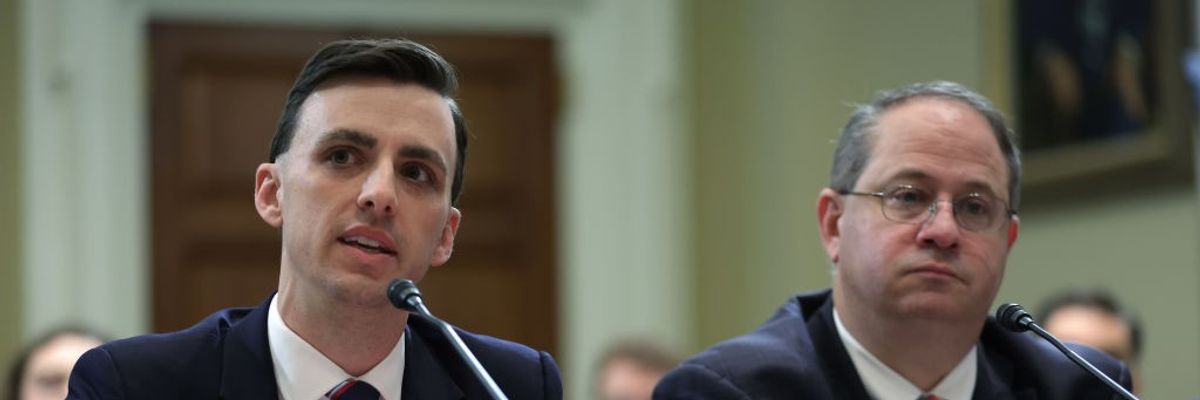
Federal Election Commission chair Sean Cooksey and Commissioner James E. Trainor III testified during a hearing on September 20, 2023.
FEC Accused of Sleeping at the Wheel as Crypto Giant Pumps Tens of Millions Into 2024 Race
"The time to hold campaign finance violators accountable is now—not after illegal election spending has corrupted our democracy," said the research director of Public Citizen.
The progressive watchdog group Public Citizen accused the U.S. Federal Election Commission of abdicating its responsibility by failing to act in the face of "illegal" election spending by the cryptocurrency exchange giant Coinbase, a federal contractor.
Public Citizen noted in a statement Thursday that "federal law bars campaign contributions to political parties, committees, or candidates from federal contractors."
The group's statement came a day after Brian Armstrong, the CEO of Coinbase, pledged that his company would pump another $25 million into Fairshake PAC, a super PAC dedicated to electing candidates supportive of the crypto industry, which has spent big to influence the outcome of the 2024 elections. Fairshake has spent roughly the same amount of money supporting Democratic and Republican candidates, reflecting the extent to which both parties have sought to court the still-nascent crypto industry.
According to Public Citizen, Armstrong's pledge brought Coinbase's total 2024 election spending above $76 million. In August, Public Citizen filed a complaint with the FEC arguing that a portion of Coinbase's spending appears to be unlawful due to the company's multimillion-dollar contract with the U.S. Marshals Service.
"Coinbase has spent more than $50 million in what appears to be illegal campaign contributions from a federal contractor to attack candidates who might stand up to Big Crypto; meanwhile, the FEC is snoozing through the election," Rick Claypool, Public Citizen's research director, said Thursday.
"The time to hold campaign finance violators accountable is now—not after illegal election spending has corrupted our democracy," Claypool added.
The FEC is currently chaired by Sean Cooksey, a Republican appointed by former president and GOP nominee Donald Trump. Evenly divided between three Democrats and three Republicans, the agency has faced backlash for refusing to take action to stem the proliferation of AI-generated deepfakes and illegal campaign spending.
What's more, as The New York Times reported earlier this year, the agency has moved aggressively in recent months to weaken already-inadequate constraints on political spending.
"One decision this spring that is already reshaping the 2024 presidential race allowed super PACs and campaigns for the first time to work together to plan and execute costly door-to-door canvassing operations," the Times noted.
Additionally, the commission "decided that a wealthy donor could put money into a trust that then could distribute donations to campaigns—while keeping the original source anonymous," the Times reported.
This year's federal election cycle is on pace to be the most expensive in U.S. history, according to OpenSecrets. An analysis released earlier this week by Americans for Tax Fairness found that billionaire families have pumped nearly $2 billion into federal elections so far—likely a significant underestimate, given that the sum excludes untraceable dark money.
An Urgent Message From Our Co-Founder
Dear Common Dreams reader, The U.S. is on a fast track to authoritarianism like nothing I've ever seen. Meanwhile, corporate news outlets are utterly capitulating to Trump, twisting their coverage to avoid drawing his ire while lining up to stuff cash in his pockets. That's why I believe that Common Dreams is doing the best and most consequential reporting that we've ever done. Our small but mighty team is a progressive reporting powerhouse, covering the news every day that the corporate media never will. Our mission has always been simple: To inform. To inspire. And to ignite change for the common good. Now here's the key piece that I want all our readers to understand: None of this would be possible without your financial support. That's not just some fundraising cliche. It's the absolute and literal truth. We don't accept corporate advertising and never will. We don't have a paywall because we don't think people should be blocked from critical news based on their ability to pay. Everything we do is funded by the donations of readers like you. Will you donate now to help power the nonprofit, independent reporting of Common Dreams? Thank you for being a vital member of our community. Together, we can keep independent journalism alive when it’s needed most. - Craig Brown, Co-founder |
The progressive watchdog group Public Citizen accused the U.S. Federal Election Commission of abdicating its responsibility by failing to act in the face of "illegal" election spending by the cryptocurrency exchange giant Coinbase, a federal contractor.
Public Citizen noted in a statement Thursday that "federal law bars campaign contributions to political parties, committees, or candidates from federal contractors."
The group's statement came a day after Brian Armstrong, the CEO of Coinbase, pledged that his company would pump another $25 million into Fairshake PAC, a super PAC dedicated to electing candidates supportive of the crypto industry, which has spent big to influence the outcome of the 2024 elections. Fairshake has spent roughly the same amount of money supporting Democratic and Republican candidates, reflecting the extent to which both parties have sought to court the still-nascent crypto industry.
According to Public Citizen, Armstrong's pledge brought Coinbase's total 2024 election spending above $76 million. In August, Public Citizen filed a complaint with the FEC arguing that a portion of Coinbase's spending appears to be unlawful due to the company's multimillion-dollar contract with the U.S. Marshals Service.
"Coinbase has spent more than $50 million in what appears to be illegal campaign contributions from a federal contractor to attack candidates who might stand up to Big Crypto; meanwhile, the FEC is snoozing through the election," Rick Claypool, Public Citizen's research director, said Thursday.
"The time to hold campaign finance violators accountable is now—not after illegal election spending has corrupted our democracy," Claypool added.
The FEC is currently chaired by Sean Cooksey, a Republican appointed by former president and GOP nominee Donald Trump. Evenly divided between three Democrats and three Republicans, the agency has faced backlash for refusing to take action to stem the proliferation of AI-generated deepfakes and illegal campaign spending.
What's more, as The New York Times reported earlier this year, the agency has moved aggressively in recent months to weaken already-inadequate constraints on political spending.
"One decision this spring that is already reshaping the 2024 presidential race allowed super PACs and campaigns for the first time to work together to plan and execute costly door-to-door canvassing operations," the Times noted.
Additionally, the commission "decided that a wealthy donor could put money into a trust that then could distribute donations to campaigns—while keeping the original source anonymous," the Times reported.
This year's federal election cycle is on pace to be the most expensive in U.S. history, according to OpenSecrets. An analysis released earlier this week by Americans for Tax Fairness found that billionaire families have pumped nearly $2 billion into federal elections so far—likely a significant underestimate, given that the sum excludes untraceable dark money.
The progressive watchdog group Public Citizen accused the U.S. Federal Election Commission of abdicating its responsibility by failing to act in the face of "illegal" election spending by the cryptocurrency exchange giant Coinbase, a federal contractor.
Public Citizen noted in a statement Thursday that "federal law bars campaign contributions to political parties, committees, or candidates from federal contractors."
The group's statement came a day after Brian Armstrong, the CEO of Coinbase, pledged that his company would pump another $25 million into Fairshake PAC, a super PAC dedicated to electing candidates supportive of the crypto industry, which has spent big to influence the outcome of the 2024 elections. Fairshake has spent roughly the same amount of money supporting Democratic and Republican candidates, reflecting the extent to which both parties have sought to court the still-nascent crypto industry.
According to Public Citizen, Armstrong's pledge brought Coinbase's total 2024 election spending above $76 million. In August, Public Citizen filed a complaint with the FEC arguing that a portion of Coinbase's spending appears to be unlawful due to the company's multimillion-dollar contract with the U.S. Marshals Service.
"Coinbase has spent more than $50 million in what appears to be illegal campaign contributions from a federal contractor to attack candidates who might stand up to Big Crypto; meanwhile, the FEC is snoozing through the election," Rick Claypool, Public Citizen's research director, said Thursday.
"The time to hold campaign finance violators accountable is now—not after illegal election spending has corrupted our democracy," Claypool added.
The FEC is currently chaired by Sean Cooksey, a Republican appointed by former president and GOP nominee Donald Trump. Evenly divided between three Democrats and three Republicans, the agency has faced backlash for refusing to take action to stem the proliferation of AI-generated deepfakes and illegal campaign spending.
What's more, as The New York Times reported earlier this year, the agency has moved aggressively in recent months to weaken already-inadequate constraints on political spending.
"One decision this spring that is already reshaping the 2024 presidential race allowed super PACs and campaigns for the first time to work together to plan and execute costly door-to-door canvassing operations," the Times noted.
Additionally, the commission "decided that a wealthy donor could put money into a trust that then could distribute donations to campaigns—while keeping the original source anonymous," the Times reported.
This year's federal election cycle is on pace to be the most expensive in U.S. history, according to OpenSecrets. An analysis released earlier this week by Americans for Tax Fairness found that billionaire families have pumped nearly $2 billion into federal elections so far—likely a significant underestimate, given that the sum excludes untraceable dark money.

